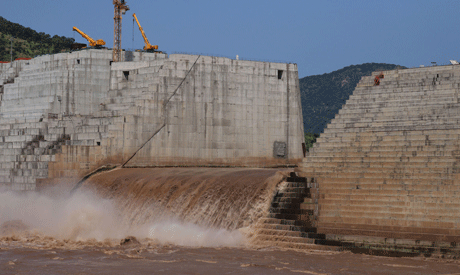
A file photo of Water flowing through GERD as it undergoes construction works. REUTERS
Arab foreign ministers will hold an extraordinary meeting in the Qatari capital of Doha on Tuesday on the disputed Grand Ethiopian Renaissance Dam (GERD) upon a request from Egypt and Sudan.
Ambassador Hossam Zaki, assistant secretary-general of the Arab League, told state-run MENA news agency that the meeting will be held on the sidelines of a consultation meeting between the Arab foreign ministers on Tuesday.
Negotiations between Ethiopia and downstream countries Egypt and Sudan stalled in April after Addis Ababa had refused the two countries' request to include the US, the EU, and the UN in mediation talks.
Tensions are running high over Addis Ababa's plan to go ahead with the second filling of the GERD's reservoir with or without a legally binding instrument with Cairo and Khartoum.
The Arab foreign ministers' meeting also comes on the back of the Arab League's decision to support both downstream countries' stances in the long-running issue, former assistant foreign minister Mohamed Hegazy told MENA.
Egypt and Sudan, Hegazy added, will brief the Arab ministers on the latest developments concerning the dispute in light of the Egyptian-Sudanese efforts to contact regional and international parties after GERD negotiations had faltered due to Ethiopia's intransigence, he added.
As a result of the stalling of the latest round of GERD negotiations, held in Kinshasa in April under the brokerage of the African Union (AU), Egypt and Sudan urged concerted international efforts to help resolve the dispute with Ethiopia.
After officials from the two downstream countries met in Khartoum for joint consultations on the dam crisis, they have urged the international community to recognise the dangers associated with the ongoing Ethiopian policy, which is based on forcing a fait accompli on the downstream countries.
The Arab ministers, Hegazy noted, are expected to be posted on the latest contacts held by Cairo and Khartoum with African countries as well as the latest efforts at the international level to prompt the international community to shoulder its responsibility towards the crisis.
Hegazy added that Tuesday's meeting is also aimed at alerting the Arab parties to the danger of the current scene on the stability of the strategic region of the Horn of Africa.
The former assistant minister said both downstream countries are set to brief the Arab ministers on "the dangers of leaving this strategic region, which is located at the east of the continent, to Ethiopian intransigence."
Hegazy asserted that the region's instability affects Arab security in the Gulf and the Red Sea because East Africa is contiguous to oil and gas supply lines as well as the movement of oil fleets through the Bab El-Mandab strait.
"This matter requires the intensification of Egyptian and Sudanese efforts and their contacts with Arab and international parties to work to contain the scene that threatens the entire region," he stressed.
Hegazy noted that Egypt will continue its efforts to brief all regional and international parties on the matter, including the United Nations Security Council (UNSC) as the situation threatens world security and peace.
Egypt and Sudan have been negotiating for almost a decade now with Ethiopia to reach a legally binding and comprehensive deal on the GERD’s construction, which Addis Ababa started to build on the Blue Nile in 2011.
On Friday, Egypt’s Irrigation Minister Mohamed Abdel-Ati said the current path of African Union- (AU) sponsored negotiations between Cairo, Khartoum, and Addis Ababa over the dam will not lead to a breakthrough, calling for widening the mediation to include the US, the EU, and the UN.
He blamed Ethiopian "intransigence" for the faltering of the negotiations over the past 10 years.
Ethiopia’s rejection of several proposals by Egypt and Sudan on the negotiation mechanism, which includes international quartet mediation, has led to the collapse of the Kinshasa talks sponsored by the AU in April.
Ethiopia plans to hold 13.5 billion cubic metres of water during the second filling of the GERD’s reservoir in July, despite the objections of Egypt and Sudan to the move in the absence of a legally binding agreement.
Egypt’s 100 million-plus population depends on the Nile for over 95 percent of its fresh water.
Sudan fears the GERD will put the operation of its Roseires dam and the lives of 20 million Sudanese citizens at “a very high risk” if an agreement regulating the operation and filling of GERD is not reached before the second filling.
It warned that it will take legal action if Ethiopia moves forward with the second filling of the GERD in July without first signing a legally binding agreement.
Short link: